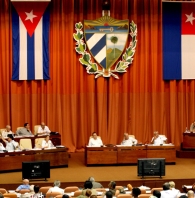Just started the National Assembly of Peoples Power in Cuba
- Submitted by: admin
- Politics and Government
- 02 / 24 / 2008

The 614 lawmakers taking office on Sunday for the 7th Legislature of the National Assembly of Peoples Power come from all walks of life in Cuba.
According to the National Election Commission, 481 of the new Parliament members -78.3 percent- are university graduates, while 127 -20.6 percent- are high school graduates.
Among the legislators taking office today for a new five-year term are engineers, professors, economists, lawyers, medical doctors and social researchers.
To 390 of them, the 7th Legislature will be their first time in office, while only 224 were reelected.
According to the Commission, 374 legislators were born after the triumph of the 1959 Revolution, while 106 (17.2 percent) lived part of their lives in capitalist Cuba.
The remaining 134 were less than 10 years old in January, 1959.
Women in the upcoming legislature account for a 43.16 percent (265 female lawmakers), and 395 legislators are white, 118 black and 101 of multiracial origin.
The legislators first task will be to select the National Assemblys president, vice president and secretary, and the new 31-member Council of State, which exercises the legislative power between the scheduled twice yearly sessions.
The Councils membership consists of a President - who is also the head of state and government -, a First Vice President, five vice presidents, a secretary, and 23 additional members.
The Council of State makes collegiate decision, and according to Article 89 of the Constitution, it is the highest domestic and international representation of the Cuban state.
To select the Council of State membership, lawmakers will follow recommendations by the National Candidature Commission, made up of student and grass root organizations.
According to National Candidature Commission chairman Amarilys Perez, there has been a broad consultation process among lawmakers, regarding the merits of the candidates to the high-ranking positions.
Article 84 of the Constitution says legislators have to duty to legislate for the benefit of the people.
They should be in contact with their voters, listen to their claims and criticism, and inform them of the State policy.
One of the National Assemblys roles is to discuss and pass national economic and social development plans and the nations budget.
The Parliament should also approve the guidelines for the national economy planning and management system.
It also makes decisions on the countrys monetary and credit system and on the islands foreign and domestic policy.
The National Assembly has the power to declare a state of war in case of a military aggression, and pass peace treaties. Legislators can also establish and modify the countrys political and administrative division.
Source: Periodico26.cu
According to the National Election Commission, 481 of the new Parliament members -78.3 percent- are university graduates, while 127 -20.6 percent- are high school graduates.
Among the legislators taking office today for a new five-year term are engineers, professors, economists, lawyers, medical doctors and social researchers.
To 390 of them, the 7th Legislature will be their first time in office, while only 224 were reelected.
According to the Commission, 374 legislators were born after the triumph of the 1959 Revolution, while 106 (17.2 percent) lived part of their lives in capitalist Cuba.
The remaining 134 were less than 10 years old in January, 1959.
Women in the upcoming legislature account for a 43.16 percent (265 female lawmakers), and 395 legislators are white, 118 black and 101 of multiracial origin.
The legislators first task will be to select the National Assemblys president, vice president and secretary, and the new 31-member Council of State, which exercises the legislative power between the scheduled twice yearly sessions.
The Councils membership consists of a President - who is also the head of state and government -, a First Vice President, five vice presidents, a secretary, and 23 additional members.
The Council of State makes collegiate decision, and according to Article 89 of the Constitution, it is the highest domestic and international representation of the Cuban state.
To select the Council of State membership, lawmakers will follow recommendations by the National Candidature Commission, made up of student and grass root organizations.
According to National Candidature Commission chairman Amarilys Perez, there has been a broad consultation process among lawmakers, regarding the merits of the candidates to the high-ranking positions.
Article 84 of the Constitution says legislators have to duty to legislate for the benefit of the people.
They should be in contact with their voters, listen to their claims and criticism, and inform them of the State policy.
One of the National Assemblys roles is to discuss and pass national economic and social development plans and the nations budget.
The Parliament should also approve the guidelines for the national economy planning and management system.
It also makes decisions on the countrys monetary and credit system and on the islands foreign and domestic policy.
The National Assembly has the power to declare a state of war in case of a military aggression, and pass peace treaties. Legislators can also establish and modify the countrys political and administrative division.
Source: Periodico26.cu
Comments